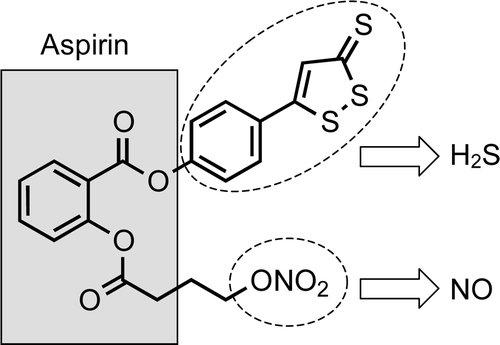New hybrid 'NOSH aspirin' as possible anti-cancer drug

Scientists have combined two new "designer" forms of aspirin into a hybrid substance that appears more effective than either of its forebears in controlling the growth of several forms of cancer in laboratory tests. Their report on the new NOSH-aspirin, so named because it releases nitric oxide (NO) and hydrogen sulfide (H2S), appears in the journal ACS Medicinal Chemistry Letters.
Khosrow Kashfi, Ravinder Kodela and Mitali Chattopadhyay point out that NO and H2S are signaling substances produced in the body that relax blood vessels, reduce inflammation and have a variety of other effects. Scientists previously developed designer aspirin that releases NO in an effort to reduce aspirin's potential adverse effects in causing bleeding in the gastrointestinal tract. Another designer aspirin that releases H2S was developed which also has anti-inflammatory properties and appears safe to the stomach.
Since NO and H2S are gases with physiological relevance, and Kashfi's group had previously shown beneficial effects with both NO- and H2S-aspirins, they postulated that a new hybrid that incorporated both of these entities might be even more potent and effective than either one alone. Their hypothesis has proved to be correct.
They found indications that the new hybrid inhibits the growth of breast, colon, pancreas, lung, prostate and some leukemia cancer cells in laboratory tests. Some of the NOSH-aspirins tested were more than 100,000 times more powerful against cancer cell growth than aspirin alone. Promisingly, the group reported that their hybrids did not damage normal cells.
More information: NOSH-Aspirin: A Novel Nitric Oxide–Hydrogen Sulfide-Releasing Hybrid: A New Class of Anti-inflammatory Pharmaceuticals, ACS Med. Chem. Lett., Article ASAP. DOI: 10.1021/ml300002m
Abstract
A series of new hybrids of aspirin (ASA), bearing both nitric oxide (NO) and hydrogen sulfide (H2S)-releasing moieties were synthesized and designated as NOSH compounds (1–4). NOSH-1 (4-(3-thioxo-3H-1,2-dithiol-5-yl) phenyl 2-((4-(nitrooxy)butanoyl)oxy) benzoate); NOSH-2 (4-(nitrooxy)butyl (2-((4-(3-thioxo-3H-1,2-dithiol-5-yl)phenoxy)carbonyl)phenyl)); NOSH-3 (4-carbamothioylphenyl 2-((4-(nitrooxy)butanoyl)oxy)benzoate); and NOSH-4 (4-(nitrooxy)butyl 2-(5-((R )-1,2-dithiolan-3-yl)pentanoyloxy)benzoate). The cell growth inhibitory properties of compounds 1–4 were evaluated in eleven different human cancer cell lines of six different tissue origins. These cell lines are of adenomatous (colon, pancreatic, lung, prostate), epithelial (breast), and lymphocytic (leukemia) origin. All NOSH compounds were extremely effective in inhibiting the growth of these cell lines. NOSH-1 was the most potent, with an IC50 of 48 ± 3 nM in HT-29 colon cancer cells. This is the first NSAID-based compound with such potency. This compound was also devoid of any cellular toxicity, as determined by LDH release. NOSH-1 was comparable to aspirin in its anti-inflammatory properties, using the carrageenan rat paw edema model.
Journal information: ACS Medicinal Chemistry Letters
Provided by American Chemical Society















